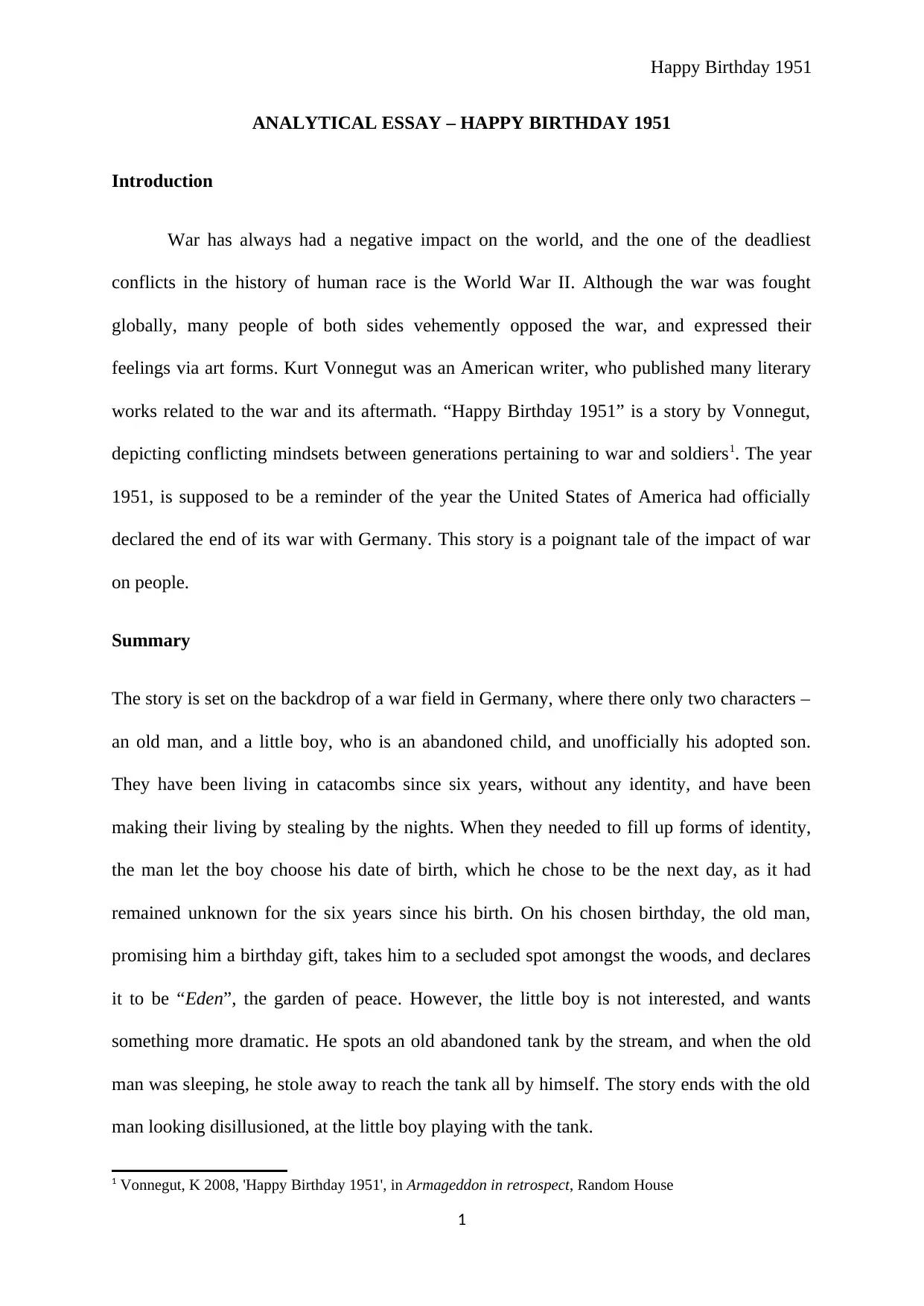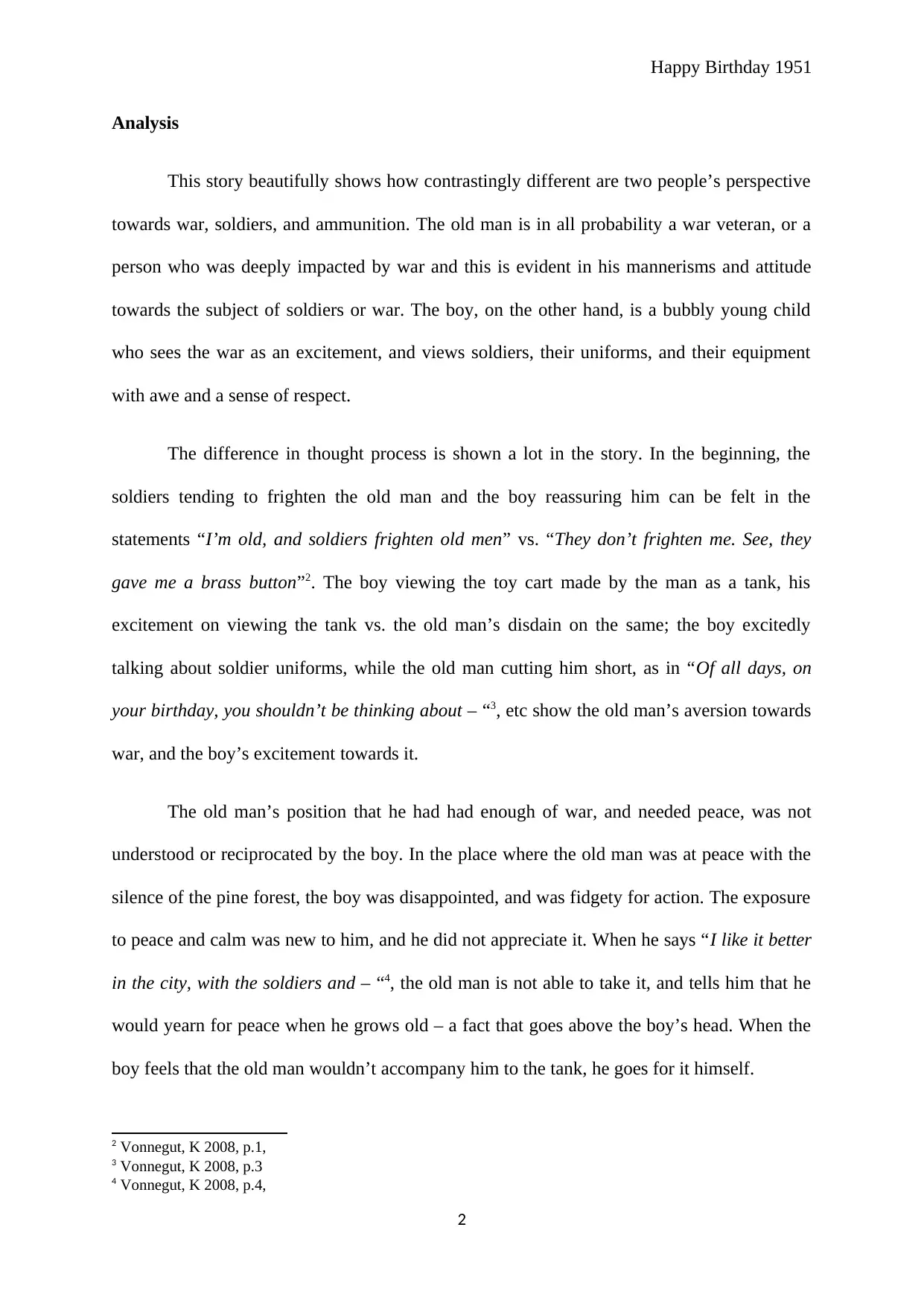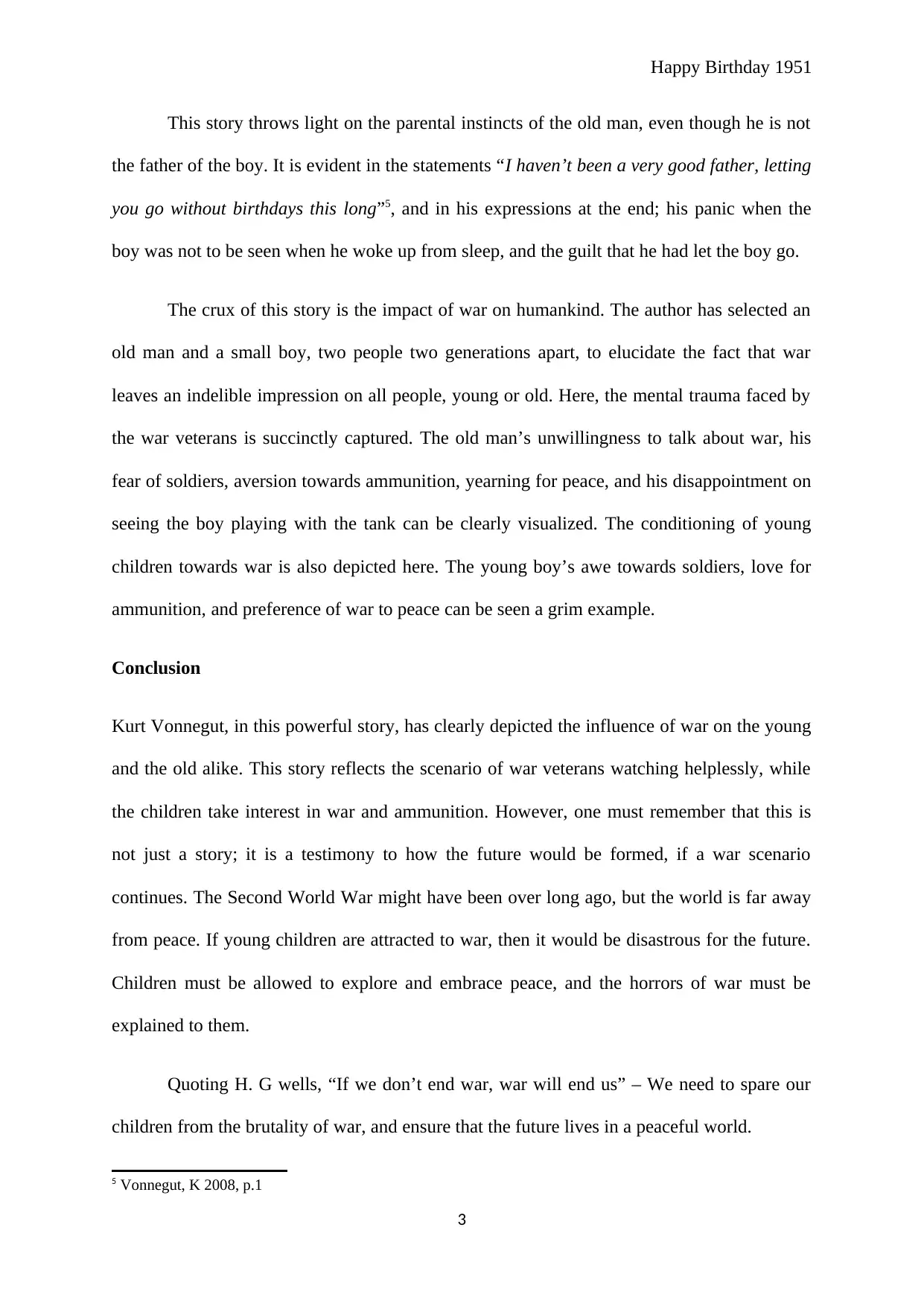Analytical Essay - Happy Birthday 1951
VerifiedAdded on 2023/06/07
|4
|1255
|355
AI Summary
This analytical essay explores the impact of war on people through Kurt Vonnegut's story Happy Birthday 1951. It depicts the contrasting mindsets of an old man and a young boy towards war and soldiers. The story reflects the scenario of war veterans watching helplessly, while the children take interest in war and ammunition. The author has selected an old man and a small boy, two people two generations apart, to elucidate the fact that war leaves an indelible impression on all people, young or old.
Contribute Materials
Your contribution can guide someone’s learning journey. Share your
documents today.

Happy Birthday 1951
ANALYTICAL ESSAY – HAPPY BIRTHDAY 1951
Introduction
War has always had a negative impact on the world, and the one of the deadliest
conflicts in the history of human race is the World War II. Although the war was fought
globally, many people of both sides vehemently opposed the war, and expressed their
feelings via art forms. Kurt Vonnegut was an American writer, who published many literary
works related to the war and its aftermath. “Happy Birthday 1951” is a story by Vonnegut,
depicting conflicting mindsets between generations pertaining to war and soldiers1. The year
1951, is supposed to be a reminder of the year the United States of America had officially
declared the end of its war with Germany. This story is a poignant tale of the impact of war
on people.
Summary
The story is set on the backdrop of a war field in Germany, where there only two characters –
an old man, and a little boy, who is an abandoned child, and unofficially his adopted son.
They have been living in catacombs since six years, without any identity, and have been
making their living by stealing by the nights. When they needed to fill up forms of identity,
the man let the boy choose his date of birth, which he chose to be the next day, as it had
remained unknown for the six years since his birth. On his chosen birthday, the old man,
promising him a birthday gift, takes him to a secluded spot amongst the woods, and declares
it to be “Eden”, the garden of peace. However, the little boy is not interested, and wants
something more dramatic. He spots an old abandoned tank by the stream, and when the old
man was sleeping, he stole away to reach the tank all by himself. The story ends with the old
man looking disillusioned, at the little boy playing with the tank.
1 Vonnegut, K 2008, 'Happy Birthday 1951', in Armageddon in retrospect, Random House
1
ANALYTICAL ESSAY – HAPPY BIRTHDAY 1951
Introduction
War has always had a negative impact on the world, and the one of the deadliest
conflicts in the history of human race is the World War II. Although the war was fought
globally, many people of both sides vehemently opposed the war, and expressed their
feelings via art forms. Kurt Vonnegut was an American writer, who published many literary
works related to the war and its aftermath. “Happy Birthday 1951” is a story by Vonnegut,
depicting conflicting mindsets between generations pertaining to war and soldiers1. The year
1951, is supposed to be a reminder of the year the United States of America had officially
declared the end of its war with Germany. This story is a poignant tale of the impact of war
on people.
Summary
The story is set on the backdrop of a war field in Germany, where there only two characters –
an old man, and a little boy, who is an abandoned child, and unofficially his adopted son.
They have been living in catacombs since six years, without any identity, and have been
making their living by stealing by the nights. When they needed to fill up forms of identity,
the man let the boy choose his date of birth, which he chose to be the next day, as it had
remained unknown for the six years since his birth. On his chosen birthday, the old man,
promising him a birthday gift, takes him to a secluded spot amongst the woods, and declares
it to be “Eden”, the garden of peace. However, the little boy is not interested, and wants
something more dramatic. He spots an old abandoned tank by the stream, and when the old
man was sleeping, he stole away to reach the tank all by himself. The story ends with the old
man looking disillusioned, at the little boy playing with the tank.
1 Vonnegut, K 2008, 'Happy Birthday 1951', in Armageddon in retrospect, Random House
1
Secure Best Marks with AI Grader
Need help grading? Try our AI Grader for instant feedback on your assignments.

Happy Birthday 1951
Analysis
This story beautifully shows how contrastingly different are two people’s perspective
towards war, soldiers, and ammunition. The old man is in all probability a war veteran, or a
person who was deeply impacted by war and this is evident in his mannerisms and attitude
towards the subject of soldiers or war. The boy, on the other hand, is a bubbly young child
who sees the war as an excitement, and views soldiers, their uniforms, and their equipment
with awe and a sense of respect.
The difference in thought process is shown a lot in the story. In the beginning, the
soldiers tending to frighten the old man and the boy reassuring him can be felt in the
statements “I’m old, and soldiers frighten old men” vs. “They don’t frighten me. See, they
gave me a brass button”2. The boy viewing the toy cart made by the man as a tank, his
excitement on viewing the tank vs. the old man’s disdain on the same; the boy excitedly
talking about soldier uniforms, while the old man cutting him short, as in “Of all days, on
your birthday, you shouldn’t be thinking about – “3, etc show the old man’s aversion towards
war, and the boy’s excitement towards it.
The old man’s position that he had had enough of war, and needed peace, was not
understood or reciprocated by the boy. In the place where the old man was at peace with the
silence of the pine forest, the boy was disappointed, and was fidgety for action. The exposure
to peace and calm was new to him, and he did not appreciate it. When he says “I like it better
in the city, with the soldiers and – “4, the old man is not able to take it, and tells him that he
would yearn for peace when he grows old – a fact that goes above the boy’s head. When the
boy feels that the old man wouldn’t accompany him to the tank, he goes for it himself.
2 Vonnegut, K 2008, p.1,
3 Vonnegut, K 2008, p.3
4 Vonnegut, K 2008, p.4,
2
Analysis
This story beautifully shows how contrastingly different are two people’s perspective
towards war, soldiers, and ammunition. The old man is in all probability a war veteran, or a
person who was deeply impacted by war and this is evident in his mannerisms and attitude
towards the subject of soldiers or war. The boy, on the other hand, is a bubbly young child
who sees the war as an excitement, and views soldiers, their uniforms, and their equipment
with awe and a sense of respect.
The difference in thought process is shown a lot in the story. In the beginning, the
soldiers tending to frighten the old man and the boy reassuring him can be felt in the
statements “I’m old, and soldiers frighten old men” vs. “They don’t frighten me. See, they
gave me a brass button”2. The boy viewing the toy cart made by the man as a tank, his
excitement on viewing the tank vs. the old man’s disdain on the same; the boy excitedly
talking about soldier uniforms, while the old man cutting him short, as in “Of all days, on
your birthday, you shouldn’t be thinking about – “3, etc show the old man’s aversion towards
war, and the boy’s excitement towards it.
The old man’s position that he had had enough of war, and needed peace, was not
understood or reciprocated by the boy. In the place where the old man was at peace with the
silence of the pine forest, the boy was disappointed, and was fidgety for action. The exposure
to peace and calm was new to him, and he did not appreciate it. When he says “I like it better
in the city, with the soldiers and – “4, the old man is not able to take it, and tells him that he
would yearn for peace when he grows old – a fact that goes above the boy’s head. When the
boy feels that the old man wouldn’t accompany him to the tank, he goes for it himself.
2 Vonnegut, K 2008, p.1,
3 Vonnegut, K 2008, p.3
4 Vonnegut, K 2008, p.4,
2

Happy Birthday 1951
This story throws light on the parental instincts of the old man, even though he is not
the father of the boy. It is evident in the statements “I haven’t been a very good father, letting
you go without birthdays this long”5, and in his expressions at the end; his panic when the
boy was not to be seen when he woke up from sleep, and the guilt that he had let the boy go.
The crux of this story is the impact of war on humankind. The author has selected an
old man and a small boy, two people two generations apart, to elucidate the fact that war
leaves an indelible impression on all people, young or old. Here, the mental trauma faced by
the war veterans is succinctly captured. The old man’s unwillingness to talk about war, his
fear of soldiers, aversion towards ammunition, yearning for peace, and his disappointment on
seeing the boy playing with the tank can be clearly visualized. The conditioning of young
children towards war is also depicted here. The young boy’s awe towards soldiers, love for
ammunition, and preference of war to peace can be seen a grim example.
Conclusion
Kurt Vonnegut, in this powerful story, has clearly depicted the influence of war on the young
and the old alike. This story reflects the scenario of war veterans watching helplessly, while
the children take interest in war and ammunition. However, one must remember that this is
not just a story; it is a testimony to how the future would be formed, if a war scenario
continues. The Second World War might have been over long ago, but the world is far away
from peace. If young children are attracted to war, then it would be disastrous for the future.
Children must be allowed to explore and embrace peace, and the horrors of war must be
explained to them.
Quoting H. G wells, “If we don’t end war, war will end us” – We need to spare our
children from the brutality of war, and ensure that the future lives in a peaceful world.
5 Vonnegut, K 2008, p.1
3
This story throws light on the parental instincts of the old man, even though he is not
the father of the boy. It is evident in the statements “I haven’t been a very good father, letting
you go without birthdays this long”5, and in his expressions at the end; his panic when the
boy was not to be seen when he woke up from sleep, and the guilt that he had let the boy go.
The crux of this story is the impact of war on humankind. The author has selected an
old man and a small boy, two people two generations apart, to elucidate the fact that war
leaves an indelible impression on all people, young or old. Here, the mental trauma faced by
the war veterans is succinctly captured. The old man’s unwillingness to talk about war, his
fear of soldiers, aversion towards ammunition, yearning for peace, and his disappointment on
seeing the boy playing with the tank can be clearly visualized. The conditioning of young
children towards war is also depicted here. The young boy’s awe towards soldiers, love for
ammunition, and preference of war to peace can be seen a grim example.
Conclusion
Kurt Vonnegut, in this powerful story, has clearly depicted the influence of war on the young
and the old alike. This story reflects the scenario of war veterans watching helplessly, while
the children take interest in war and ammunition. However, one must remember that this is
not just a story; it is a testimony to how the future would be formed, if a war scenario
continues. The Second World War might have been over long ago, but the world is far away
from peace. If young children are attracted to war, then it would be disastrous for the future.
Children must be allowed to explore and embrace peace, and the horrors of war must be
explained to them.
Quoting H. G wells, “If we don’t end war, war will end us” – We need to spare our
children from the brutality of war, and ensure that the future lives in a peaceful world.
5 Vonnegut, K 2008, p.1
3

Happy Birthday 1951
References
Vonnegut, K 2008, 'Happy Birthday 1951', in Armageddon in retrospect, Random House
4
References
Vonnegut, K 2008, 'Happy Birthday 1951', in Armageddon in retrospect, Random House
4
1 out of 4
Related Documents
Your All-in-One AI-Powered Toolkit for Academic Success.
+13062052269
info@desklib.com
Available 24*7 on WhatsApp / Email
![[object Object]](/_next/static/media/star-bottom.7253800d.svg)
Unlock your academic potential
© 2024 | Zucol Services PVT LTD | All rights reserved.